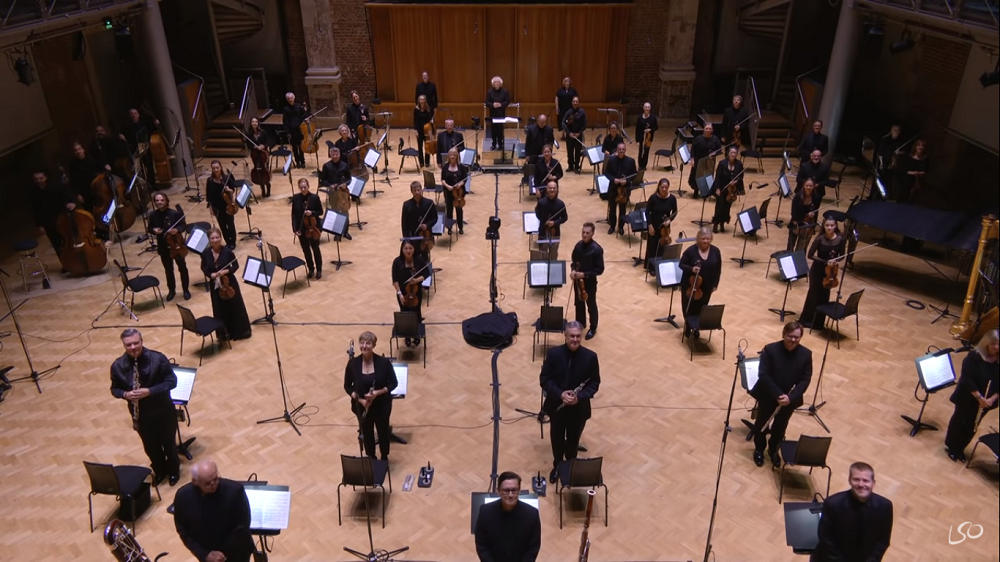Poulenc’s La voix humaine comes close, but Bartók’s Bluebeard’s Castle has to be the perfect lockdown opera, this heady tale of two mismatched souls stuck in a confined space (admittedly an enormous one) alarmingly pertinent. Simon Rattle’s London Symphony Orchestra should have been performing the work on a Japanese tour this autumn, but it’s difficult to imagine anyone feeling short-changed by this streamed performance, available to watch on the orchestra’s YouTube channel.
Eberhard Kloke’s chamber reduction of Bartók’s score, which was advertised as the version used, allows for an orchestra of around 30 players. Here, with fuller strings, we get twice as many, the sound closer to what one would hear in an opera house. You worry whether the punchier moments will register, but they do; the opening of the sun-drenched fifth door is glorious, the stark major chords looking back to Bartok’s idol Strauss and prefiguring a fruity climax in Vaughan Williams’ ballet Job.
Exquisite orchestral playing is a given from this partnership, Rattle’s unfussy direction summoning up a rich carpet of string tone and some gorgeous wind solos. Rattle’s preoccupation with salient detail never gets in the way of the music’s momentum here. Tempi are broad, but there’s a thrilling sense of inevitability, of forward movement. And we’re constantly reminded of what a superb ear for colour Bartók had, particularly in his more opulent early works. Judith’s opening of the third door is an extraordinary moment, Bartók’s opulent bejewelled vistas all surface glitz and precious little substance. The opening of the first door is suitably chilling here, the orchestra’s collective sighs a brilliantly effective special effect. Judith spots “piles of cruel arms and armour/Countless, fearful battle weapons” behind the third, the dotted martial rhythms hinting at the ugliness of what she sees.  Rattle’s singers, Karen Cargill and Gerald Finley, are exemplary. As a pair they’re so well characterised; Cargill breathless, curious and emotive, Finley stern and reserved. Finley’s Bluebeard exudes power and menace even when doing very little, his voice full of colour even in its depths. Looking at the libretto, you’re struck by how taciturn his character is, Judith’s florid, expressive lines countered by Bluebeard’s sullen monosyllables. As Judith, Cargill flits between filling St Luke’s with sound and dropping to a whisper, the brightness and warmth of tone dissipating as Béla Balázs’s libretto unfolds. She’s adamant that the eponymous castle needs light, air and sunshine, Bluebeard’s “joyless dwelling” clearly in need of attention.
Rattle’s singers, Karen Cargill and Gerald Finley, are exemplary. As a pair they’re so well characterised; Cargill breathless, curious and emotive, Finley stern and reserved. Finley’s Bluebeard exudes power and menace even when doing very little, his voice full of colour even in its depths. Looking at the libretto, you’re struck by how taciturn his character is, Judith’s florid, expressive lines countered by Bluebeard’s sullen monosyllables. As Judith, Cargill flits between filling St Luke’s with sound and dropping to a whisper, the brightness and warmth of tone dissipating as Béla Balázs’s libretto unfolds. She’s adamant that the eponymous castle needs light, air and sunshine, Bluebeard’s “joyless dwelling” clearly in need of attention.
Direction is minimal: this is a concert performance, not a semi-staged one. Cargill makes effective use of a spiral staircase, but that’s about as much physical movement as we get, and need. Subdued lighting and occasional projections add to the gothic ambience, the fleeting glimpses of bright sunshine achieved with the simplest of means. And, heard through decent speakers or headphones, this Bluebeard sounds marvellous – that it’s available online for free is nothing short of remarkable.














Add comment